Rauan: When we chatted in person you mentioned that a big part of your outrageous onstage persona is a pushback against over-serious readers (performers of their own poetry, I mean) who, as you said, have absolute “no sense of humor.” Can you talk a bit more about these “serious” readers and your more “fun” and outrageous style then as a kind of antidote?
Evan: Poets are often outrageously arrogant and self-important, blaming readers if they don’t enjoy the work. What a cop-out. That grave delivery of words from a podium: is it any wonder most people don’t read poetry? I prefer poetic rock stars (though they can be just as arrogant). I’d rather be humble in person and outrageous during readings. I maintain that level of performance and spectacle to give the audience a multi-sensory experience. I want them to leave feeling gratified that they came to see it, hear it, not just read it. I want them to see costumes, hear me sing the disturbing pop lyrics I’ve brought attention to on the page, and occasionally eat whatever curious thing I set out for them.
RK: your books (The Midnight Channel and Skin Job) are filled with monsters and slasher film victims (final girls, or in a few instances, boys) but for me what stands out most is an experience and atmosphere of exuberance and glee. Are the books, then, just like yr reading performances, meant to be “fun” also??
EJP: Yes, absolutely! I feel that if I had fun writing a piece, many readers will have that fun reading it. Without an element of camp and glee, poetry (especially work as dark as mine) quickly becomes an exercise in despair, punishing the audience. I do love Sylvia Plath’s bombastic technicolor despair, but I don’t want to be an icy, detached poet, that arrogant “fuck you, dear reader” poet. I hate that guy. I want my reader to tap-dance with me through the haunted children’s hospital.
*****
Okay, so those were the first questions and answers of my latest Seattle Author Spotlight, the 12th, featuring Evan J. Peterson. I first met Evan when he performed along with me at Kris Hall’s Da’daedal at the Highline several months ago. I was impressed and taken by Evan’s poems and remember also that Evan ripped his shirt off before he read his last poem. “It felt right,” is what I think he said afterward.
Evan’s outrageous on stage, of course, but is also a very kind, respectful and civilized person who has the literary chops to back up his style and delivery. Evan’s an extremely positive and vibrant part of the local writing scene.
And to follow is the rest of my interview with Evan. A brief bio Evan provided me can be found at the end of the interview.
*****
RK: To give our readers a taste of your work can you please provide us a brief(ish) excerpt of your work?
EJP: Here’s a bit of the poem for Nancy Thompson, final girl of A Nightmare on Elm Street, from The Midnight Channel. It employs the film’s rope-skipping rhyme about the vengeful ghost of the burned child molester, Freddy Krueger. The film itself makes dead, disfigured child molesters far more amusing than I ever would:
1, 2 Freddy’s coming for you
Why, these kids today—
dying with their headphones on.
Making messes.3, 4 Better lock your door
Death rises, smears the ceiling.
Your friends are bags of blood,
sixteen going on dead-as-fuck.Nancy, honey, can we discuss what post-
traumatic stress has done
to your hair?
RK: “Skin Job” seems to me, in some ways, more complicated and ambitious than “The Midnight Channel.” And it feels more “personal” too. Can you tell us a bit about the different ways in which you approached and made these two books?
EJP: Skin Job contains some poems from a longer manuscript, rather experimental and ambitious, entirely in the voice of Frankenstein’s creature, whose body is a mess of members. That’s when I started wearing corsets on stage, to represent
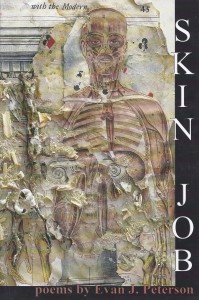 the idea that the Creature is so full of viscera that his stitches might burst at any moment, showering the audience in gore like the television at the end of Videodrome. The corset is literally holding this fragile beast together, an idea I stole from Paul Morrissey’s Flesh for Frankenstein.
the idea that the Creature is so full of viscera that his stitches might burst at any moment, showering the audience in gore like the television at the end of Videodrome. The corset is literally holding this fragile beast together, an idea I stole from Paul Morrissey’s Flesh for Frankenstein.
Fragmentation of form and image became vital to that project. I’ve had trouble getting that one published, so here’s Skin Job in the mean time. The poems from the longer book have been de- and re-contextualized to be the voice of an archetypal All-Monster, who speaks often directly to the reader. Skin Job is also chock full of additional poems unrelated or barely related to the Frankenstein book, pieces that more fully explore the monster-as-speaker.
The Midnight Channel is an entirely separate project, odes to female hero/survivors and a few queer males of horror cinema. A poem like “Why I Want to Fuck Norman Bates” is much more lucid and straightforward than a poem like “A Fly on the Lens” from Skin Job. The Midnight Channel for all its humor is more brutal, precisely because it features a more straightforward voice. Just imagine how nasty the b-side poems are that didn’t make it in (The Cell, The Thing, Texas Chainsaw Massacre…).
RK: We talked a little about the word “queer” and how its definition is widening, becoming more inclusive. I was surprised to hear that some people are even identifying polyamorous straight men as “queer.” This, however, doesn’t sit entirely well for you because you think (if I got this right) that for someone to be called “queer” they need to be of a group that has been mistreated, prejudiced against. Can you expand on this, plz?
EJP: Certainly. There are straight people who think they deserve to be called “queer” for being kinky or having multiple partners. “Straight” is beyond heterosexual; it implies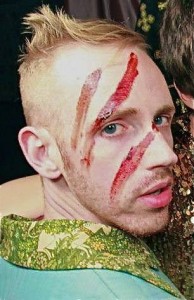 conforming to gender as well. A heterosexual male-bodied transvestite is queer, because he has to deal with our culture’s hatred of all things feminine. That’s what homophobia is: refined misogyny, hatred of “masculine” women and “feminine” men, and especially those who refuse to be one or the other.
conforming to gender as well. A heterosexual male-bodied transvestite is queer, because he has to deal with our culture’s hatred of all things feminine. That’s what homophobia is: refined misogyny, hatred of “masculine” women and “feminine” men, and especially those who refuse to be one or the other.
While sexually adventurous straight folk, male and female (particularly female) are still discriminated against in America, that doesn’t make them “queer.” Queer, by its very nature, is positioned against and outside of tidy sexual category. Queer disrupts what people want to keep rigid about gender and sexuality. And in particular, I think for someone to earn the re-empowered term “queer,” they have to be disempowered in the first place. Straight boys aren’t persecuted and beaten in school for having multiple girlfriends. Straight women aren’t murdered for being dominatrixes. We cannot say this about people who are gay, bisexual, trans, etc. For any kinky straight people to claim queerness is almost akin to putting on blackface. It’s an insult.
RK: To give our readers a 2nd taste of your work can you please provide us a 2nd brief(ish) sample of your work?
EJP: Here are some of the Great Modern Ones from “Monstrous Gods” in Skin Job:
…gods of film and light and steam,
of medicine and speed;gods of flesh and divided flesh—
God of Parts, the Hot Dissector;
Goddess of Needles and Thread;She Who Numbs but Never Heals,
the Opiated Spider Head;Spirit of Smog, Bronchitis God, Sacred City Air;
Patrons of the Auto Crash, their glass
in constant shatter…
RK: Can you talk about your yr experience of performing within a Rocky Horror show for many years and what impact this had on your performing your own poetry? (same goes for your participating in Slam events)
EJP: Being on a Rocky Horror cast taught me so much about not simply performance, but interacting with audience. Being a lip-synch based performance, body and facial expression are vital. I also learned that most people enjoy a sexually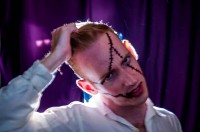 transgressive spectacle now and then. When appropriate, I love to break the “fourth wall” and step out into the audience. Touch them. Reading *is* performance. God help me if I ever choose a static public reading from a page rather than an interactive spectacle.
transgressive spectacle now and then. When appropriate, I love to break the “fourth wall” and step out into the audience. Touch them. Reading *is* performance. God help me if I ever choose a static public reading from a page rather than an interactive spectacle.
From slam, I learned that performance can easily overshadow the craft and content of a poem. I’m not speaking of the truly brilliant wordcrafters in the slam community, but audiences (especially drunk ones) can be easily impressed by a charismatic twerp with few writing skills. This even happens among page poets who don’t usually take the stage–charisma over actual talent. Then again, one of the most beautiful things about slam is that it’s nonacademic and anticlassist, and the bravery to speak in public is lauded as its own triumph. I try diligently to have my wordcraft on the page be as strong, if not stronger, than whatever my charisma can achieve in performance.
RK: In addition to being a writer, performer and educator you are also one of the principals of Minor Arcana Press. Can you tell us a bit about what books you’ve published? (and a bit about what books are in the pipeline)
EP: What I’m most proud of about Minor Arcana Press is that we’re publishing brilliant and daring people, all of whose work has been overlooked and underrated by other publishing houses. At a year old, we have three books out and three on the way. Skin Job was our first, followed by Morris Stegosaurus’s brilliant and hilarious Zebra Feathers. Everyone should be reading Morris; he’s a genius and an audacious adventurer into what’s possible in poetry. Vincent Kovar of local nonprofit Gay City Health Project hired us to produce their fifth literary anthology, Gay City 5: Ghosts in Gaslight, Monsters in Steam, which includes fiction, essays, poetry, and art by such titans as Dorothy Allison, CAConrad, and Jon Macy.
Our next book will be Drawn to Marvel, a 300 page anthology tracking decades of poetry about comic books, edited by Bryan Dietrich and Marta Ferguson. That one’s going to be a very big deal. We’ll follow that with Lydia Swartz’s poetry card deck, Shufflepoems, just as soon as we figure out how to print a book in card form. And next Halloween we launch Monster Fancy, a journal of high- and low-brow writing and art for the discerning monster enthusiast.
RK: why at some of your readings (performances) do you strip down to just an S & M corset?
EP: Why the hell wouldn’t I?
***
Brief Bio:
Evan J. Peterson is the author of Skin Job (Minor Arcana Press) and The Midnight Channel (Babel/Salvage Press) as well as volume editor of Gay City 5: Ghosts in Gaslight, Monsters in Steam. His poetry, fiction, journalism, and criticism have appeared in Weird Tales, The Stranger, The Rumpus, Assaracus, Nailed, Court Green, and Aim for the Head: An Anthology of Zombie Poetry, from which his poetry was excerpted in The New York Times. For more, check evanjpeterson.com
***
Previous Spotlights
Tags: Evan J. Peterson, Seattle Author Spotlight

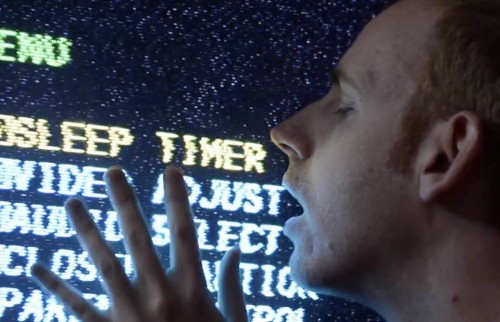
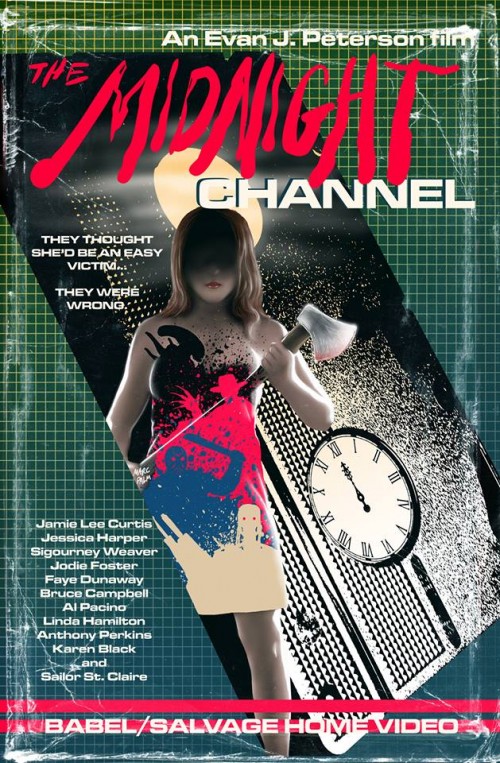
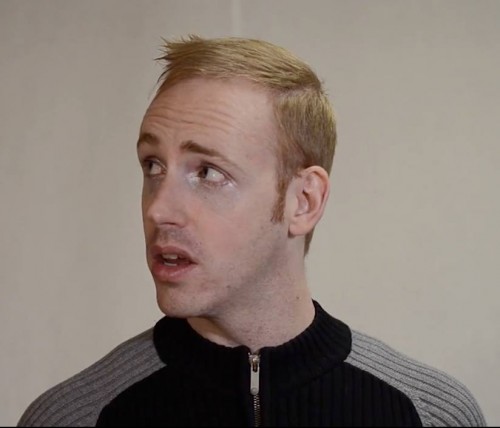
I miss the shirtless Evan Peterson, though he stalks me in the shadows everywhere I go.